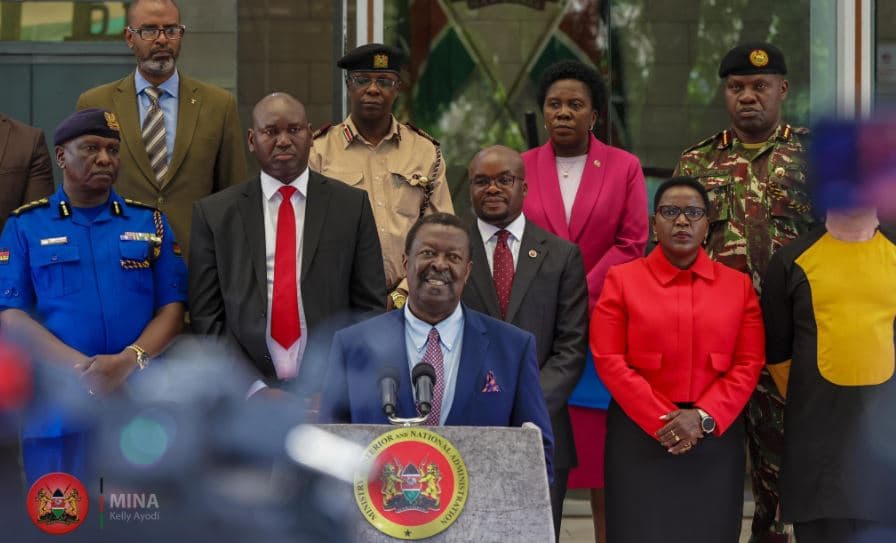We're loading the full news article for you. This includes the article content, images, author information, and related articles.
Kenya has moved to calm diplomatic tensions, reaffirming its commitment to international law and highlighting the critical economic stakes for both nations after Ugandan President Yoweri Museveni warned of future wars over sea access.

NAIROBI, KENYA – Monday, November 17, 2025, 06:42 AM (EAT) – Kenya’s Prime Cabinet Secretary and Cabinet Secretary for Foreign and Diaspora Affairs, Musalia Mudavadi, has formally assured Uganda of its continued and unfettered access to the Indian Ocean through the Port of Mombasa. The assurance follows inflammatory remarks made by Ugandan President Yoweri Museveni, who warned of potential future wars if landlocked nations are denied sea access, claiming the ocean "belongs to me."
Speaking at a media briefing on Kenya's foreign policy, Mudavadi emphasized that facilitating trade for its landlocked neighbours is a cornerstone of Kenya's strategic and economic interests. "Kenya is a responsible member of the international community, and it is in our interest to facilitate any landlocked country that wishes to use the port of Mombasa," Mudavadi stated. He posed a rhetorical question to underscore the port's purpose: "And, in any case, what would be the value of the port if it does not generate revenue?"
The diplomatic episode was ignited on Sunday, November 9, 2025, when President Museveni, during a radio interview in Mbale City, described the denial of sea access to landlocked countries as "madness." He expressed deep frustration over what he termed "endless discussions" with Kenya on crucial trade infrastructure projects like the railway and oil pipeline. "That ocean belongs to me. Because it is my ocean. I am entitled to it. In future, we are going to have wars," Museveni declared, in a statement that sent shockwaves across the East African Community (EAC).
Kenyan officials, including Foreign Affairs Principal Secretary Korir Sing'oei, initially sought to downplay the comments, suggesting they were metaphorical and that Museveni has a "great understanding" of international territorial laws. However, the directness of the language prompted a more formal and high-level response from Mudavadi to reaffirm Kenya's position.
The rhetoric highlights the deeply intertwined economies of Kenya and Uganda. The Port of Mombasa is the primary trade gateway for Uganda, a dependency that shapes the bilateral relationship. According to the latest data from the Kenya Ports Authority (KPA) for the 2024 calendar year, Uganda remains the largest transit destination for cargo from Mombasa, accounting for 65.7% of all transit volumes. In 2024, a total of 8.8 million tonnes of cargo handled by the port were destined for Uganda, a significant 23.8% increase from the 7.11 million tonnes recorded in 2023.
This trade is a vital revenue source for Kenya, supporting the KPA, the Standard Gauge Railway (SGR), and a vast logistics and transport ecosystem. Any disruption or shift of this cargo to alternative routes, such as Tanzania's Port of Dar es Salaam, would have significant economic repercussions for Kenya. For Uganda, which relies on Kenya for approximately 90% of its refined petroleum products, stable access through the Northern Corridor is an existential economic and security concern.
In his response, CS Mudavadi anchored Kenya's position in established international law. The 1982 United Nations Convention on the Law of the Sea (UNCLOS), ratified by both nations, grants landlocked states the right of access to and from the sea and freedom of transit through neighbouring states. This is further reinforced by regional treaties, including the Northern Corridor Transit and Transport Agreement (NCTTA), which provides a detailed framework for the movement of goods for Uganda, Rwanda, Burundi, South Sudan, and the DRC through Mombasa.
Analysts note that while these conventions guarantee the *right of access*, they also fully recognize the sovereignty of the transit state—in this case, Kenya. Foreign policy analyst Gordon K'achola clarified that the law protects transit rights, not territorial claims, and that any attempt by Uganda to seek exclusive control could be perceived as territorial encroachment. The dispute comes amid a broader regional push by landlocked nations for better sea access, with Ethiopia's recent controversial port deal with Somaliland raising similar sovereignty questions.
Despite the heated rhetoric, both nations have a recent history of working to resolve trade disputes. In July and September 2025, officials from both countries signed agreements to eliminate non-tariff barriers and improve logistics at border crossings. Mudavadi has previously emphasized resolving such issues through diplomatic channels within the EAC. The current diplomatic assurances from Nairobi aim to steer the conversation back towards these cooperative frameworks and away from conflict, reinforcing a partnership critical to the stability and prosperity of the entire East African region.
Keep the conversation in one place—threads here stay linked to the story and in the forums.
Sign in to start a discussion
Start a conversation about this story and keep it linked here.
Other hot threads
E-sports and Gaming Community in Kenya
Active 9 months ago
The Role of Technology in Modern Agriculture (AgriTech)
Active 9 months ago
Popular Recreational Activities Across Counties
Active 9 months ago
Investing in Youth Sports Development Programs
Active 9 months ago